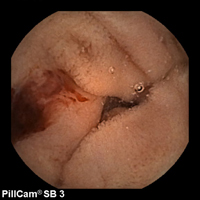Obscure GI bleeding, defined as bleeding from the GI tract that persists or recurs without an obvious etiology after oesophagogastroduodenoscopy (OGD), colonoscopy, and radiologic evaluation of the small bowel such as small bowel follow-through or enteroclysis, though in practice, patients are typically diagnosed with obscure bleeding based on upper endoscopy and colonoscopy results alone without undergoing radiologic procedures. Obscure gastrointestinal bleeding could be overt or obscure based on the presence or absence of clinically evident bleeding.




